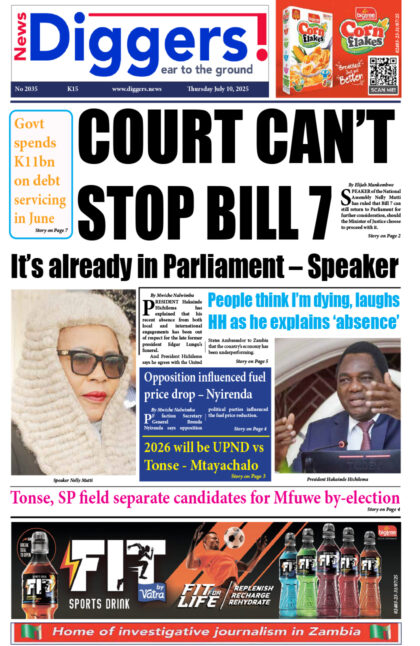UPND president Hakainde Hichilema says Zambia needs a complete lockdown to halt any new infections of the deadly COVID-19 virus.
Zambia has so far recorded a total of three confirmed cases of Coronavirus, with the first being a Zambian couple that travelled to France and came back to Lusaka aboard an Emirates flight, while the third confirmed case was a Lusaka-based man who returned from a trip to Pakistan.
Speaking during a briefing in Lusaka, Monday, Hichilema called on the government to completely lock down the entire country’s border points for at least a period of 14 days to halt the spread of the deadly pandemic, which has wreaked havoc across the globe.
He further called for the removal of all import duties and other taxes on medical equipment and personal protective equipment, including masks.
“What needs to be done, given these inadequacies in our healthcare delivery system, in addition to the measures announced by the Ministry of Health, number one: we need a complete lockdown of Zambia for at least two weeks to halt new infections. It means that we should not allow flights from different countries, not even those that may have not recorded cases of Coronavirus; we should have a complete lockdown for 14 days to protect our people. Number two: we should enhance testing for COVID-19 and extend testing services to all the 10 provinces of Zambia. Number three: we ought to mobilize medical staff, retired medical staff, to be alert for a possible call to help and enlist help from the private sector. Number four: we must procure enough medical equipment and protective clothing for medical personnel on the front line, those who are serving or standing in harms way because this disease is deadly. Number Five: we must restrict unnecessary movements in our homes, all of us without exceptions,” Hichilema said.
“Number six: we should encourage all workers, private and public, to work from home. Number seven: we must encourage [people] to deal with electronic transactions more than physical cash transactions. Number eight: we must restrict inter-city movement; domestic travel within cities must be restricted unless it is absolutely necessary. Number nine: we must limit all gatherings to small numbers, probably 50 is too much, maybe far less then 50, even five, to protect lives. Number 10: restaurants and cafes should operate take-away services only, and not allow people to sit in restaurants for three to four hours as they wait to be served as the potential to be infected increases. Number 11: remove all import duties and other taxes on medical equipment and personal protective equipment, including masks, all of those equipment, medicines, accessories that we need in the fight against COVID-19; they must be free of duty and any other taxes.”
He added that Parliament must reconvene, virtually, and approve a supplementary budget to fund COVID-19 activities and further called Parliament to exercise strict oversight over all funds allocated to the fight against the disease.
“Number 12: we must reconvene Parliament to sit, not physically, but virtually and approve a supplementary budget to fund the COVID-19 activities to buy equipment, to buy facilities even to pay for adverts in the private media and other platforms so that people can understand what to do at a personal-level. We must not leave it at the goodwill of the private media to advertise, to promote these life-saving measures; we must pay for it as a country. It is cheaper to pay for it than to lose lives! Number 13: we must withdraw, immediately, as a country, Bill 10 and channel all the time, all the energy into the fight against COVID-19. There is no justification to continue with Bill 10 and to continue spending time and resources when citizens are dying out of COVID-19 infections, and many more will die if we do not take these measures,” Hichilema cautioned.
“Number 14: Parliament must exercise strict oversight over all funds, all resources that are released to fight COVID-19; [the funds] must not be stolen! Not even a penny, not even a ngwee must be stolen from anyone. This corruption habit we have seen by those controlling public offices, please, lay your hands off any funds, any resources that are allocated to the fight against COVID-19. We cannot be that cruel to profit from death, to profit from lives of our citizens, that will be irresponsible! So, Parliament should exercise oversight on all those resources that are channelled towards the fight against COVID-19.”
But he expressed doubt that the country had only three confirmed cases of COVID-19 due to the limited testing capabilities.
“Coronavirus is real; Coronavirus is deadly! The World Health Organization (WHO) advised African nations to immediately implore proactive mechanisms to combat the spread of COVID-19. In our case, here the Ministry of Health has confirmed three cases. So, COVID-19 is no longer a tale from a distant place, COVID-19 is amidst us. However, due to limit testing capacities in our country, there could be a number of undetected cases. From experience elsewhere, acceleration of COVID-19 is steep if prevention interventions are delayed. Guidance from the WHO is that African countries should prepare for the worst case scenario. Once we provide for the worst case scenario, then we can nip the problem in the bud by assuming aggressive approach in the process of combating COVID-19,” Hichilema said.
And he said the measures announced by Health Minister Dr Chitalu Chilufya may fall short as the country’s healthcare delivery system had no capacity to contain COVID-19.
“We are cognizant of measures announced by Ministry of Health to prevent or reduce COVID-19. But these measures from the Ministry of Health fall short of the scale of the problem at hand because of the following issues: Our healthcare delivery system has no capacity to contain the full-scale of COVID-19 due to the following: limited diagnosis capabilities mainly are at UTH only; UTH has only 18 ventilators; the country needs thousands of ventilators, but only 18 ventilators are at UTH; as you know, COVID-19 patients do need to have ventilation, a lot of ventilation; good ventilation, if I may say so; there is not enough medical staff in our healthcare delivery system; not enough protective equipment, that is another challenge; there are also limited treatment options. Due to the above glaring inadequacies in our healthcare system, a number of Western embassies are evacuating what they deem as non-essential staff from Zambia; it tells you that the situation is serious,” said Hichilema.




















3 responses
Total shutdown if you Hakainde can contribute to care for the less privileged, remember 75% of Zambians can’t even afford to by a bag of meal meal
Chilekwa
Learn that HH is not Govt. He is contributing his ideas. That’s is right.
hh, please take your patience to the urge for power, if it may, your time will come. Don’t politicize the world wide harsal, if you have funds as you claim quietly donate to avoid lamented spot areas.
Bill 10, and covid_19 are different episodes. As Zambians we needed B10 to take care of the youths, women, disabled, and the sooth electrical process above all life of workers after retirement.
Don’t mislead people, let’s together positively scale down the pedermic